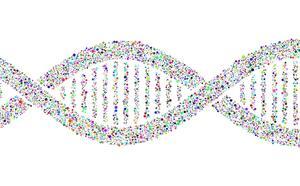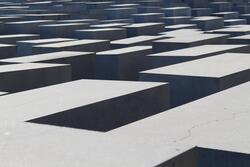"Jewish DNA"
Several years ago, my aunt spit into a tube. While this action seems irrelevant and a little gross, in retrospect, her saliva changed the way I view my identity.
My aunt sent the tube to a DNA analyzing company, 23andMe. The results she received identified her as 99% Ashkenazi Jew. Knowing that relatives on the other side of my family had gotten similar results, I concluded that I was probably also about 99% Jewish. I found it strange that other religions couldn’t be traced through DNA, and yet Judaism could be identified so accurately. Don’t DNA tests usually just show geographic areas of descent?
My confusion led me to believe that Judaism is a race. Following the conception of my belief, I argued with my friends at school during lunch, insisting that genetic markers in DNA proved Judaism to be more than “just a religion.” It wasn’t until years later, when many more people of color entered my communities and my life, that I realized just how harmful this attitude was. In fact, it wasn’t until then that I realized just how racist this attitude was.
I am white, and people never believe me to be anything other than white. I’ve benefited from centuries of racist laws and imperialism. So to imply that my race is anything other than white is to undermine a long history of racial struggles around the world. It is to ignore the dozens of ways my white privilege aids me every single day.
It's been easy to ignore my white privilege because I live in a majority white area, and I’ve never known anything other than racial privilege. I simply don’t think about race when I buy band-aids or undergarments, because I don’t have to; these items are designed for people who look like me. I don’t think about race when I enter stores, because it’s not a reality for me that I might be a suspected thief or a perceived threat while I shop. I don’t think about race when I enter my classes, because most of my classmates and teachers share my skin tone. Reflection on these everyday occurrences has led me to understand that it’s far easier to ignore race when you’re a beneficiary of privilege than when you’re a target of oppression. And my claim that Judaism is a race was a tactic to ignore my privilege.
My ignorance not only upheld systems of racial inequity; it also encouraged a hierarchy of what a “true Jew” looks like. By claiming that Judaism is a race, I’d been furthering the stereotype that all Jews look alike. The reality is that Jews cannot be identified by noses, hair, skin color, or any other physical trait. Yes, there is much common ancestry among Jews due to our relatively small population and a history of isolation in certain parts of the world; however, an assumption of Jewishness based on outward appearance is hurtful and antisemitic. These assumptions often exclude Jews of Color, Jewish converts, people with one Jewish parent, and many other groups of Jews. I had been encouraging these assumptions, and the erasure of these Jews, by claiming that Judaism is a race.
The hurtful impact of my mistake doesn’t stop there, because I had also failed to realize that DNA tests generally identify only Ashkenazi Jews. Ashkenazi Jews are Jews of northern and eastern Europe origin, meaning they are primarily white Jews (though it’s important to acknowledge that there are Ashkenazi Jews of Color). Once again, I’d furthered the assumption that being Jewish means being white. My arguments had ignored a huge portion of the Jewish population, erasing them from the Jewish community.
I’ve tried to right my wrong by educating my friends—the same ones I’d argued with at lunch—about the many different ways that Judaism and Jewish people can look. In response, my friends sometimes tease me about my previous misconception, and I’m grateful that I never won our arguments or convinced them that my religion is a race. But words have power, and I know that I contributed to a culture of antisemitism and white supremacy with mine.
I see now, after education from people of color (education which should NOT have been their burden), that I’d used my Judaism as a shield to avoid acknowledging my white privilege. Because yes, it’s uncomfortable to confront my privilege and biases. But I understand now that it's so much more than uncomfortable for people of color to live in a world where I don’t fight to expel my racist prejudices.
And that doesn’t make me perfect. I still catch myself taking my white privilege for granted, and acting on subconscious biases. But catching myself is the first step. Because being Jewish doesn’t make me less racist. Being a woman doesn’t make me less racist. Being queer doesn’t make me less racist. No matter how many targeted identities I possess, I'm not excused from the ways in which I’ve oppressed others. There’s no hiding from my privilege or pretending it doesn’t impact every facet of my life. Denying I have white privilege only strengthens the systems of oppression all around me. Denial gives more power to a world built on an assumption of whiteness. So going forward, I’ve made it a goal to embrace the ways in which I fall short. I try to understand how I’ve upheld a world of white supremacy, and then act to change it. Because I can acknowledge my racial prejudice and still be anti-racist. Committing to anti-racism means I must fight it everywhere I see it, including within myself.
This piece was written as part of JWA’s Rising Voices Fellowship.







It seems to me that you are a good and decent person (we all live and learn, we are not born all-knowing) who is trying to heap everyone elses sins onto her shoulders. Take a deep breath and love yourself.
Belle, reading this was so hurtful to me. I cried a little. Your ignorance specifically targets me, and I can’t believe you were so adamant about your beliefs that you argued and tried to convince others that they were WRONG. You say you’ve learned your lesson now, but what does that do to reverse the harm you’ve already caused? I guess this stresses the importance of educating yourself before speaking, because your ignorant behavior hurt me and continues to hurt me right now. :(
In reply to Belle, reading this was so… by Anna Goldbaum
Anna, I'm sorry that my words were so hurtful and retraumatizing to you. Your pain and disgust is valid. I hope that white readers will learn from my ignorance, and I hope that I will continue growing and understanding my privilege, as well as how to avoid these mistakes in the future. I can't erase the harm I've caused, and feeling guilty is not enough...I am not the victim here. Thank you for calling me out and helping me learn, despite the emotional labor I burdened you with.